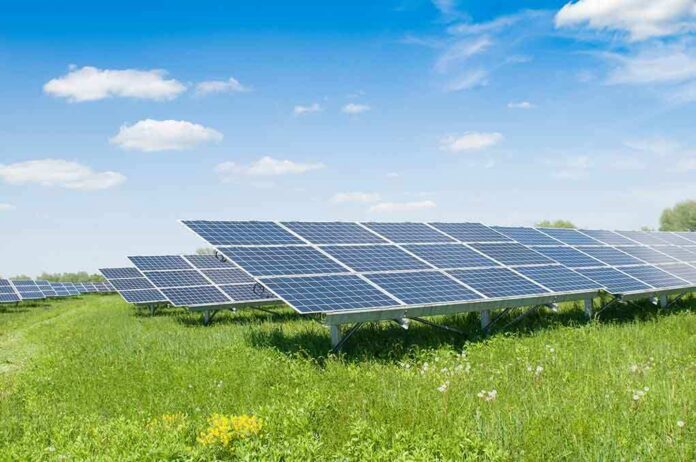
Trump administration moves to reclaim $5 billion in taxpayer funds from failed green energy ventures of the Biden era, exposing massive waste and mismanagement just as major industry players collapse into bankruptcy.
Key Takeaways
- The Energy Department is canceling seven major loans and loan guarantees approved under Biden, totaling approximately $5 billion in green energy commitments.
- Sunnova’s Project Hestia, which received a $3 billion loan guarantee, is now filing for bankruptcy after accusations of predatory practices.
- Monolith’s $953 million loan guarantee for clean hydrogen faces termination as the company runs short on cash and experiences project delays.
- Energy Secretary Chris Wright is signaling a strategic shift toward nuclear energy investments rather than continuing Biden’s green energy agenda.
- Transmission infrastructure inadequacies have crippled renewable energy expansion in states with aggressive decarbonization goals.
Massive Green Loan Program Faces Trump Administration Axe
In a significant policy reversal, the Trump administration is making decisive moves to reclaim billions of dollars in green energy funding approved during Biden’s term. The Energy Department has announced plans to cancel seven major loans and loan guarantees totaling approximately $5 billion, targeting projects that have shown signs of financial instability or questionable business practices. This reclamation effort represents a substantial shift in federal energy policy and highlights the precarious financial position of several high-profile green energy ventures that received substantial government backing.
The most substantial cancellation affects Sunnova’s Project Hestia, which received a conditional $3 billion loan guarantee under Biden’s Department of Energy. The project, which claimed it would make solar power “available to more American homeowners,” is now filing for bankruptcy after facing intense scrutiny for alleged predatory lending practices toward homeowners. This case exemplifies the pattern of rushed funding decisions that prioritized ideological climate goals over sound financial assessment during the previous administration.
— J Michael Waller (@JMichaelWaller) March 18, 2025
Failed Projects Highlight Wasteful Spending
Another major casualty in this financial cleanup is Monolith, a Nebraska-based company that received a $953 million loan guarantee for a clean hydrogen project. According to reports, the company is now “running short on cash and facing project delays,” as reported by The Wall Street Journal. Similarly, New Jersey’s ambitious Clean Energy Corridor, backed by a $716 million federal loan guarantee, has stalled after the cancellation of multiple offshore wind projects and persistent environmental permit challenges that have made the project economically unsustainable.
“The Energy Department plans to cancel seven major loans and loan guarantees that had been conditionally approved under the Biden administration,” according to a recent Energy Department statement.
These financial interventions demonstrate the Trump administration’s commitment to fiscal responsibility and protecting taxpayer interests. Critics of Biden’s green energy push have long warned that rapid deployment of unproven technologies and business models posed significant financial risks. The current wave of loan cancellations appears to validate those concerns, as companies that received conditional approval for federal backing have encountered substantial operational and financial difficulties.
Infrastructure Failures Expose Green Energy Fantasy
The broader context of these loan cancellations reveals systemic problems with the green energy transition strategy. In the Pacific Northwest, Oregon and Washington set ambitious decarbonization goals but have been stymied by inadequate transmission infrastructure. The Bonneville Power Administration (BPA) has approved only one out of 469 large renewable projects to connect to its grid since 2015, creating a severe bottleneck for regional clean energy development plans.
“The people who, technically speaking, are in charge of our transmission system are dropping the ball,” said Oregon state Rep. Mark Gamba, a Democrat who sponsored this year’s failed legislation aimed at creating a state grid improvement authority.
This infrastructure failure has resulted in increased electricity rates and potential power outages, demonstrating how unrealistic climate goals can have serious consequences for energy reliability and affordability. The situation in the Northwest serves as a cautionary tale about the practical challenges of implementing green energy policies without addressing fundamental infrastructure requirements and realistic timelines.
Pivoting to Nuclear: A Practical Energy Strategy
While canceling problematic green energy loans, the Trump administration is signaling a potential pivot toward nuclear energy. Energy Secretary Chris Wright has indicated that the Loan Programs Office (LPO) may shift its focus to nuclear energy projects, which offer more reliable baseload power without the intermittency issues plaguing solar and wind. This strategic realignment represents a more practical approach to clean energy development that prioritizes reliability and effectiveness over ideological commitments to specific technologies.
“We’re bringing back an industry that was abandoned. We’re going to put the miners back to work,” said President Trump
The emerging energy strategy under the Trump administration appears to balance fiscal responsibility with energy security concerns. By canceling poorly conceived green energy loans while potentially supporting nuclear development, the administration is establishing a more balanced approach to America’s energy future—one that considers economic realities alongside environmental goals and doesn’t sacrifice reliability or taxpayer funds for unsustainable ideological projects.












